| | Mathison Museum of Natural History |  |
|
+23Ana Rakel spacelab Gecko08 Taos Megaptera Duck-Anch-Amun 75senta75 Kikimalou Saarlooswolfhound Bonnie RtasVadumee landrover Advicot Roger rogerpgvg lucky luke Caracal pipsxlch widukind SUSANNE endogenylove bmathison1972 27 posters |
|
| Author | Message |
|---|
widukind
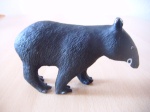
Country/State : Germany
Age : 48
Joined : 2010-12-30
Posts : 45745
 |  Subject: Re: Mathison Museum of Natural History Subject: Re: Mathison Museum of Natural History  Tue Jan 12, 2021 2:11 pm Tue Jan 12, 2021 2:11 pm | |
| |
|
  | |
widukind

Country/State : Germany
Age : 48
Joined : 2010-12-30
Posts : 45745
 |  Subject: Re: Mathison Museum of Natural History Subject: Re: Mathison Museum of Natural History  Tue Jan 12, 2021 2:11 pm Tue Jan 12, 2021 2:11 pm | |
| |
|
  | |
bmathison1972
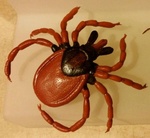
Country/State : Salt Lake City, UT
Age : 52
Joined : 2010-04-13
Posts : 6710
 |  Subject: Re: Mathison Museum of Natural History Subject: Re: Mathison Museum of Natural History  Wed Jan 13, 2021 12:19 pm Wed Jan 13, 2021 12:19 pm | |
| Species: Locusta migratoria (Linnaeus, 1758) (migratory locust) About the Figure: Manufacturer: Kaiyodo Series: Natural Monuments Year of Release: Unknown Size/Scale: Body length (including wings) 5.4 cm, with scale 1:1 Frequency of species in toy/figure form (at time of posting): Uncommon Miscellaneous Notes: This figure came from a limited series called Natural Monuments, not to be confused with the Natural Monuments of Japan collection. It is similar to, but not a copy of, the original Chocoegg figure (however, like the Chocoegg figure, assembly is required). Also, unlike most migratory locust figures, this one is actually painted as the migratory/gregarious phase! About the Animal: Geographic distribution: Much of the Old World, including much of Africa (outside of the Sahara Desert), Europe, much of Asia, Japan, northern Australia, New Zealand Habitat: Highly variable, including lowland forests, river deltas, grasslands, deserts, disturbed areas, and agricultural fields, often in open areas Diet: Grasses IUCN Status (at time of posting): Least Concern Miscellaneous Notes: Locusta migratoria transitions between the solitary and gregarious phases based on population density. As the population gets larger, it slowly transitions from the solitary phase to the gregarious phase (with intermediate phases as well). The solitary phases tend to be brown and green while the gregarious phase is yellow-brown without green. [You must be registered and logged in to see this image.] |
|
  | |
Bonnie
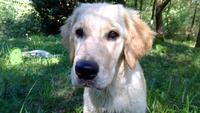
Country/State : UK
Age : 19
Joined : 2020-10-14
Posts : 5584
 | |
  | |
Caracal
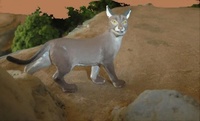
Country/State : France
Age : 65
Joined : 2018-10-24
Posts : 7252
 | |
  | |
Kikimalou
Admin
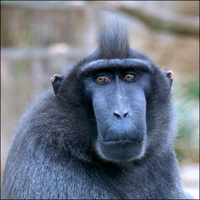
Country/State : Lille, FRANCE
Age : 60
Joined : 2010-04-01
Posts : 21169
 |  Subject: Re: Mathison Museum of Natural History Subject: Re: Mathison Museum of Natural History  Thu Jan 14, 2021 1:45 am Thu Jan 14, 2021 1:45 am | |
| Beautiful  |
|
  | |
bmathison1972

Country/State : Salt Lake City, UT
Age : 52
Joined : 2010-04-13
Posts : 6710
 |  Subject: Re: Mathison Museum of Natural History Subject: Re: Mathison Museum of Natural History  Thu Jan 14, 2021 1:03 pm Thu Jan 14, 2021 1:03 pm | |
| Species: † Lutra lutra whiteleyi Gray, 1867 (Japanese river otter) About the Figure: Manufacturer: Kaiyodo Series: Capsule Q Museum - Shikoku Year of Release: 2013 Size/Scale: Figure height 6.3 cm. Body length (excluding tail) 6.0 cm, for a scale of 1:9.5-1:15.8 Frequency of species in toy/figure form (at time of posting): Rare (as subspecies) Miscellaneous Notes: Minimal assembly is required. I also have the 2018 Papo Eurasian river otter to represent the mainland/nominate subspecies (although I haven't entirely ruled-out substituting it for the 2021 CollectA figure; will have to wait to see collectors' pics online). About the Animal: Geographic distribution: Japan Habitat: Lakes, rivers, ponds, streams, canals Diet: Fish, freshwater crustaceans, insects, plant material IUCN Status (at time of posting): Extinct Miscellaneous Notes: Sometimes classified as a separate species ( L. nippon), the Japanese river otter was formally declared extinct in 2012. Its extinction is believed to have been caused by overhunting for their pelts and contamination of freshwater environments. [You must be registered and logged in to see this image.] |
|
  | |
widukind

Country/State : Germany
Age : 48
Joined : 2010-12-30
Posts : 45745
 |  Subject: Re: Mathison Museum of Natural History Subject: Re: Mathison Museum of Natural History  Thu Jan 14, 2021 1:07 pm Thu Jan 14, 2021 1:07 pm | |
| |
|
  | |
Bonnie

Country/State : UK
Age : 19
Joined : 2020-10-14
Posts : 5584
 |  Subject: Re: Mathison Museum of Natural History Subject: Re: Mathison Museum of Natural History  Thu Jan 14, 2021 1:59 pm Thu Jan 14, 2021 1:59 pm | |
| Such a gorgeous Otter!  Especially as the dog in my avatar is called Otter!  |
|
  | |
Kikimalou
Admin

Country/State : Lille, FRANCE
Age : 60
Joined : 2010-04-01
Posts : 21169
 |  Subject: Re: Mathison Museum of Natural History Subject: Re: Mathison Museum of Natural History  Thu Jan 14, 2021 2:12 pm Thu Jan 14, 2021 2:12 pm | |
| A great one, it is too bad this nice animal is extinct. |
|
  | |
rogerpgvg
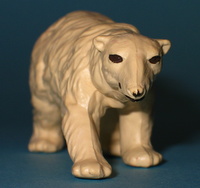
Country/State : UK
Age : 54
Joined : 2016-04-29
Posts : 3894
 |  Subject: Re: Mathison Museum of Natural History Subject: Re: Mathison Museum of Natural History  Thu Jan 14, 2021 7:14 pm Thu Jan 14, 2021 7:14 pm | |
| How different is the Japanese river otter from the European? Could a figure of a Japanese otter be used as a European, or are there too many differences?
I didn't comment on the locust, but when I saw the photo I initially thought it was a real-life photos; the figure, setting and photo are so good! |
|
  | |
bmathison1972

Country/State : Salt Lake City, UT
Age : 52
Joined : 2010-04-13
Posts : 6710
 |  Subject: Re: Mathison Museum of Natural History Subject: Re: Mathison Museum of Natural History  Thu Jan 14, 2021 7:42 pm Thu Jan 14, 2021 7:42 pm | |
| - rogerpgvg wrote:
- How different is the Japanese river otter from the European? Could a figure of a Japanese otter be used as a European, or are there too many differences?
I didn't comment on the locust, but when I saw the photo I initially thought it was a real-life photos; the figure, setting and photo are so good! You can use a Japanese otter for a European one just fine, they are the same species. The subspecies statuses for Eurasian otters are a matter of debate anyway. Morphologically, there is not much, if anything, different. |
|
  | |
Caracal

Country/State : France
Age : 65
Joined : 2018-10-24
Posts : 7252
 | |
  | |
bmathison1972

Country/State : Salt Lake City, UT
Age : 52
Joined : 2010-04-13
Posts : 6710
 |  Subject: Re: Mathison Museum of Natural History Subject: Re: Mathison Museum of Natural History  Fri Jan 15, 2021 1:03 pm Fri Jan 15, 2021 1:03 pm | |
| Species: Cuculus canorus Linnaeus, 1758 (common cuckoo) About the Figure: Manufacturer: Kaiyodo Series: Choco Q Animatales Series 9 Year of Release: 2004 Size/Scale: Figure stands 4.5 cm tall. Measured along spine, body length 6.0 cm for a scale of 1:5.5 Frequency of species in toy/figure form (at time of posting): Very rare Miscellaneous Notes: Being a Choco Q figure, assembly is required. I am aware of only two figures of this species, both by Kaiyodo: this one, and one in the Birdtales line featuring the chick being fed by a host! About the Animal: Geographic distribution: Much of Europe and Asia; one subspecies winters in sub-Saharan Africa Habitat: Highly variable, including forests, meadows, steppes, moorlands, agricultural fields, disturbed areas, yards and gardens Diet: Primarily insects, occasionally eggs and chicks of host bird IUCN Status (at time of posting): Least Concern Miscellaneous Notes: Cuckoos are best known for their social parasitism. The female cuckoo lays an egg in the nest of another species; the cuckoo's egg mimics the egg of the host species and will vary in color depending on what the host is. The female cuckoo will also remove an egg of the host bird, so the number of eggs in the nest remains the same. The cuckoo chick usually hatches earlier than those of the host, and will dispatch the other eggs or chicks so it receives all of the food brought by the host bird. [You must be registered and logged in to see this image.] |
|
  | |
Bonnie

Country/State : UK
Age : 19
Joined : 2020-10-14
Posts : 5584
 | |
  | |
widukind

Country/State : Germany
Age : 48
Joined : 2010-12-30
Posts : 45745
 |  Subject: Re: Mathison Museum of Natural History Subject: Re: Mathison Museum of Natural History  Fri Jan 15, 2021 1:07 pm Fri Jan 15, 2021 1:07 pm | |
| |
|
  | |
Taos

Country/State : W.Sussex,United Kingdom
Age : 58
Joined : 2010-10-03
Posts : 7492
 | |
  | |
Caracal

Country/State : France
Age : 65
Joined : 2018-10-24
Posts : 7252
 | |
  | |
bmathison1972

Country/State : Salt Lake City, UT
Age : 52
Joined : 2010-04-13
Posts : 6710
 |  Subject: Re: Mathison Museum of Natural History Subject: Re: Mathison Museum of Natural History  Sat Jan 16, 2021 1:58 pm Sat Jan 16, 2021 1:58 pm | |
| Species: Pectinia lactuca (Pallas, 1776) (lettuce coral) About the Figure: Manufacturer: Yujin Series: Corals in Colour Year of Release: 2005 Size/Scale: Figure 3.0 cm wide for a scale of 1:33 for a large specimen Frequency of species in toy/figure form (at time of posting): Unique Miscellaneous Notes: The Yujin corals are small and made out of a limestone-calcium carbonate sandstone, rather than the usual PVC. They make great accessories for other marine wildlife. About the Animal: Geographic distribution: Indo-Pacific Habitat: Reefs, usually on lower slopes in turbid water at depths of 1-15 meters Diet: Planktonic organisms that drift within reach IUCN Status (at time of posting): Vulnerable Miscellaneous Notes: Pectinia lactuca is a colonial reef-building coral. Colonies are submassive or form thick plates with radiating bodies. [You must be registered and logged in to see this image.] |
|
  | |
Bonnie

Country/State : UK
Age : 19
Joined : 2020-10-14
Posts : 5584
 |  Subject: Re: Mathison Museum of Natural History Subject: Re: Mathison Museum of Natural History  Sat Jan 16, 2021 2:03 pm Sat Jan 16, 2021 2:03 pm | |
| |
|
  | |
Caracal

Country/State : France
Age : 65
Joined : 2018-10-24
Posts : 7252
 |  Subject: Re: Mathison Museum of Natural History Subject: Re: Mathison Museum of Natural History  Sat Jan 16, 2021 2:08 pm Sat Jan 16, 2021 2:08 pm | |
| |
|
  | |
widukind

Country/State : Germany
Age : 48
Joined : 2010-12-30
Posts : 45745
 |  Subject: Re: Mathison Museum of Natural History Subject: Re: Mathison Museum of Natural History  Sat Jan 16, 2021 5:04 pm Sat Jan 16, 2021 5:04 pm | |
| |
|
  | |
bmathison1972

Country/State : Salt Lake City, UT
Age : 52
Joined : 2010-04-13
Posts : 6710
 |  Subject: Re: Mathison Museum of Natural History Subject: Re: Mathison Museum of Natural History  Sun Jan 17, 2021 1:16 pm Sun Jan 17, 2021 1:16 pm | |
| Species: Lucanus cervus (Linnaeus, 1758) (European stag beetle) About the Figure: Manufacturer: CollectA Series: Little Wonders Year of Release: 2015 Size/Scale: Body length (including mandibles) 7.0 cm, within scale 1:1 Frequency of species in toy/figure form (at time of posting): Uncommon Miscellaneous Notes: When this figure was first released, the line was called 'Insects' and included reptiles and amphibians; the line is now called Little Wonders. The smaller figure in the image is the miniature counterpart of the larger figure; it was released in 2020 as part of the Mini Insects and Spiders collection. All of the figures in the mini collection are simply smaller versions of the standard-sized CollectA figures. This miniature stag beetle has a body length of 4.2 cm (including mandibles), making it about 1:2 for a large major male (it is technically within the 1:1 scale for a male, but a male that small would probably be a minor male and have much shorter mandibles). About the Animal: Geographic distribution: Europe, east into parts of the Middle East and Central Asia Habitat: Old-growth hardwood forests Diet: Larvae feed in rotting wood of hardwood trees, particularly Quercus (oak), but also Tilia (lime), Fagus (beech), Acer (maple), Populus (poplar), and Fraxinus (ash), among several others; also rotting timber, bark chippings, compost heaps in gardens, and other detritus. Adults feed on nectar and tree sap. IUCN Status (at time of posting): Near Threatened Miscellaneous Notes: Larvae of L. cervus require large, old trees in which to develop. The destruction of old-growth forests throughout Europe has lead to a substantial decline in the beetle's population. It is extinct in some European countries and very rare in many others. It is now protected throughout much of its range. [You must be registered and logged in to see this image.][/i][/i] |
|
  | |
Caracal

Country/State : France
Age : 65
Joined : 2018-10-24
Posts : 7252
 |  Subject: Re: Mathison Museum of Natural History Subject: Re: Mathison Museum of Natural History  Sun Jan 17, 2021 2:48 pm Sun Jan 17, 2021 2:48 pm | |
| I prefer the big version whose proportions are far better! It's a rather common species here.. :) |
|
  | |
bmathison1972

Country/State : Salt Lake City, UT
Age : 52
Joined : 2010-04-13
Posts : 6710
 |  Subject: Re: Mathison Museum of Natural History Subject: Re: Mathison Museum of Natural History  Sun Jan 17, 2021 3:19 pm Sun Jan 17, 2021 3:19 pm | |
| - Caracal wrote:
- I prefer the big version whose proportions are far better! It's a rather common species here.. :)
Yes, the populations appear to be more secure in southern Europe. When I lived in the Czech Republic, they were rare to virtually extinct in Bohemia (at least where I was) but common in southern Moravia. |
|
  | |
Sponsored content
 |  Subject: Re: Mathison Museum of Natural History Subject: Re: Mathison Museum of Natural History  | |
| |
|
  | |
| | Mathison Museum of Natural History |  |
|
